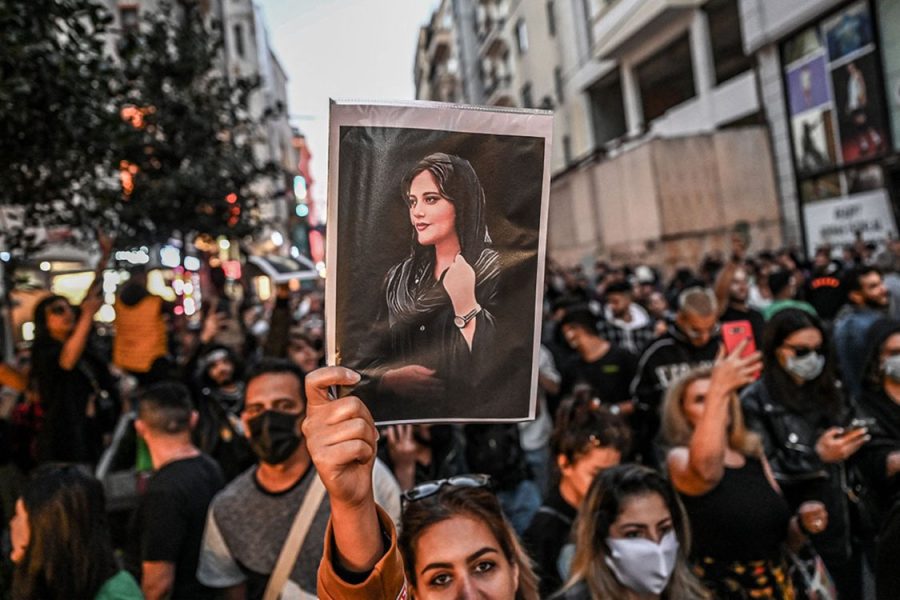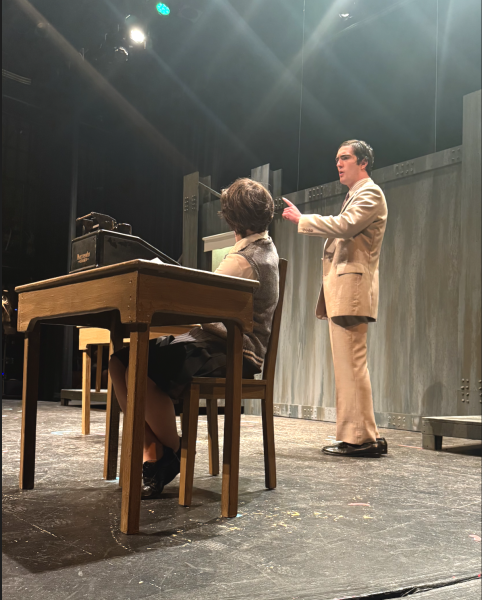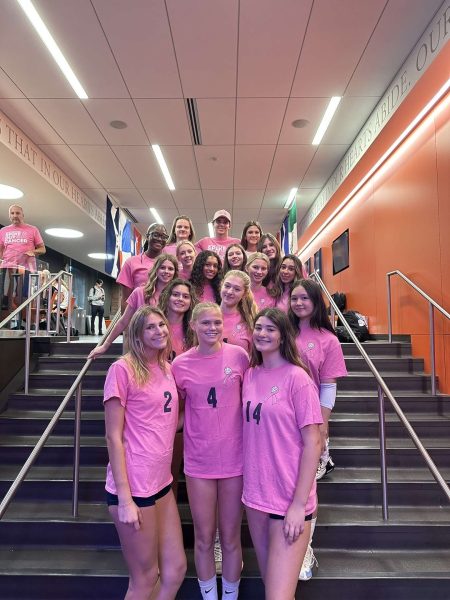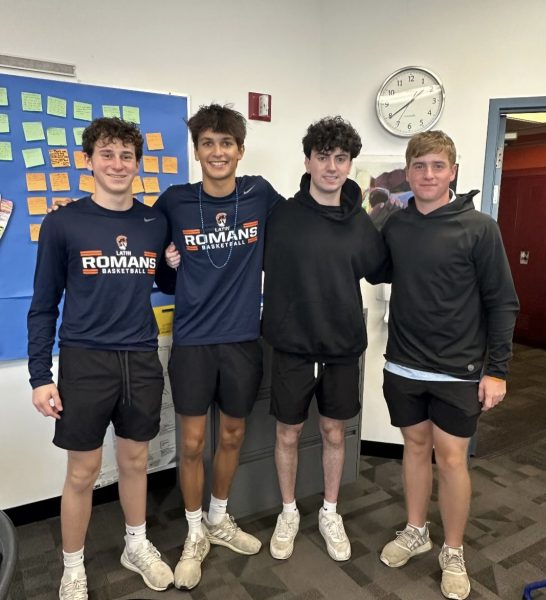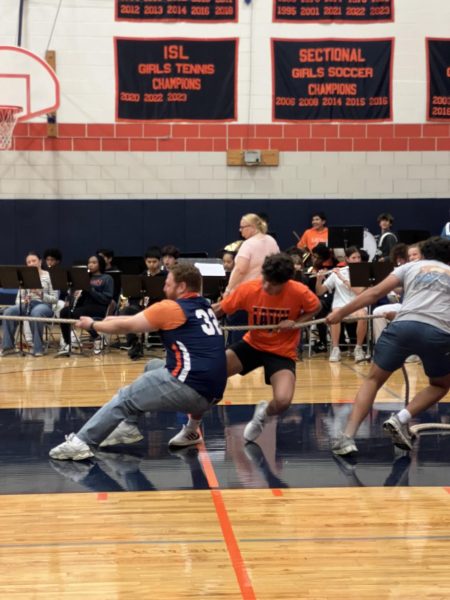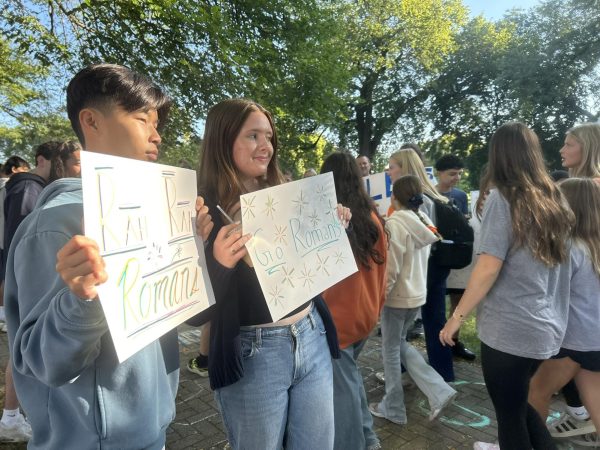Difficult Dialogues Panel Expands Discussions of Iranian Protests
A protester in Iran holds a photo of Mahsa Amini.
Mahsa Amini was arrested by the Iranian morality police on September 13, 2022, for not wearing her hijab correctly, and three days later, she died in police custody after allegedly being beaten by authorities. Her death sparked women-led protests across Iran, which have since turned into a revolution, demanding women’s rights, freedom, and democracy in the Islamic Republic. To address the globally pressing and complex protests, Latin’s Difficult Dialogues Coordinator and Upper School history teacher Matthew June organized a panel presentation at Latin consisting of Interfaith America Senior Director of Special Projects Jenan Mohajir, writer and activist Hoda Katebi, and Upper School math teacher Laura Ilkhchi. At an assembly on January 5, Upper School students listened to the panelists’ unique perspectives and opinions on the Iran protests.
Dr. June explained how he organized the panel, saying, “This panel arose, in part, out of conversations with some parents who responded to our fall message about difficult dialogues and the protests in Iran. Almost immediately, we connected with Jenan Mohajir, who works with Interfaith America, the same group whose director was featured during last year’s MLK Workshop day.” He added that Hoda Katebi was also recommended by many people due to her personal connection to Iran and views on the protests.
Dr. June added, “Finally, from the start of our discussions about the protests, Ms. Ilkhchi expressed her interest in participating, and, to all of our benefit, bravely shared her own family’s experience in Iran while thoughtfully connecting that history to many pressing issues still facing us today.”
During the panel, Ms. Mohajir, Ms. Katebi, and Ms. Ilkhchi focused on the injustices occurring under the current Iranian government, as well as the cultural implications of the uprising and lessons people around the world can learn from the current situation in Iran. Ms. Mohajir described how the protests symbolize a revolt against the global rise of authoritarian government and the importance of unity during increasingly divisive times. Similarly, Ms. Katebi suggested that the Iranian protests should be seen as a global unifier to remedy existing racial and religious divides in Iran and across the globe. Ms. Ilkhchi agreed, emphasizing the idea of these protests having broad societal implications that are not limited to the issues of one group or another.
When asked why he thought it was important for students to hear the panel presentation, Dr. June said, “[Latin’s Diversity, Equity, and Inclusion team and I] wanted to highlight the complex choices that Muslim women faced when following their faith while also protesting the authoritarian regime in Iran. To expose students to a more in-depth understanding of the protests in Iran as well as these broader issues of choice, I thought it was very important for students to hear all of the perspectives on the panel.”
Junior Nisa Ahmed, head of the Islamic Student Association, said, “I think the panel was extremely beneficial for the community because it educated the entire Upper School on a very big issue that’s happening across the world that lots of people don’t know the details about.” She added, “The main lesson I learned from the panel was that this issue is so much bigger than I knew, and it’s important to look at these kinds of issues from as many different perspectives as you can.”
One of those perspectives was from Ms. Ilkhchi. She was born in Iran and then moved to the United States at the age of 7 because her parents wanted her to have a college education, which was not possible for a female in Iran. When asked why she wanted to be on the panel, Ms. Ilkhchi responded, “The events in Iran are very important and near to my heart. I’m seeing all the brave women of Iran—who, by the way, were chosen as Time magazine’s Heroes of the Year—and other brave Iranians putting their entire life on the line every day for the last three-and-a-half months. The least I can do from afar is to raise awareness so we can continue to support them by pressuring the regime.”
Senior Madison Vanderbilt, co-head of the Intersectional Feminist Alliance, shared some of her thoughts about the panel, saying, “The protests in Iran aren’t simply founded on the issues of women’s rights, but [they go] to the fundamental belief that people should have the right to choose.” She said, “If we confine the issues to only women’s issues, we could endanger ourselves from seeing the full story of the forces playing out in Iran, from the political and economic turmoil and suppression of religious and ethnic minorities.”
Nisa echoed Madison’s sentiments, saying, “I thought it was especially valuable that the panelists brought attention to the fact that this protest can’t be simplified to just an issue about the hijab, but something much bigger.”
A common misunderstanding of the Iranian protests is that, because it is a women-led movement, it is solely about women’s rights. However, the protesters include men and women, young and old, from around the world, who are not just demanding women’s rights, but changes to a myriad of economic, political, and cultural issues that have plagued Iran since the current regime’s rise to power in 1979. Ms. Ilkhchi explained, “The people of Iran have faced so many economic hardships and so much oppression at the hands of the regime that they reached a boiling point with news of Mahsa Amini’s death.”
Before 1979, Iran was moving more toward becoming a modern, Westernized nation, with reforms including the expansion of women’s rights and educational opportunities. That all changed when anti-Westernization protesters ousted the Iranian Shah from power. He was replaced with Ayatollah Khomeini, who created the Islamic Republic of Iran, installing extreme interpretations of Islamic values into law and destroying any hope of a democratic Iran.
The Ayatollah’s regime is still in power and has viciously cracked down on protesters. Ms. Ilkhchi said, “So many people have been taken into custody—over 20,000 at this point—and abused and raped. They have literally lost everything they own, and many were given the death penalty, mostly with sham trials that lasted a few minutes and no legal representation. Four of the death penalties have already been carried out, and yet these people are still out on the streets protesting and fighting for their freedom. I can’t even begin to imagine having that kind of bravery.”
When asked what she thought the protests can teach people in the U.S. and all over the world, Ms. Ilkhchi responded with a list of valuable lessons, saying, “How important it is to value multiple views and conversations without shutting it down because it doesn’t agree with our own, [and] how beautifully we cover these events and come together but also how quickly we move on and forget it’s still happening.” She continued to list, “How privileged we are; reminder to not take our freedoms and rights for granted and realize how fragile our democracy is.”
Madison agreed, saying, “Our panelists drew parallels to our democracy—how it’s so fragile and can crumble within an instant.”
Dr. June said he thought the panel presentation was a success. “I thought all of the panelists did a wonderful job adding nuance, as well as some heart and soul, to our understanding of the situation in Iran. They spoke with passion and insight that I believe caught the attention of many students.”
He continued, “I also believe it was meaningful for many students, particularly our female students, our Muslim students, and our students of color, to see themselves represented on a stage that does not always center their voices or perspectives. Beyond that, the panel prompted me to think in new ways about the connections between the protests in Iran and everything from sanctions to our domestic prison system.”
“I found the perspectives and experiences of the panelists truly inspiring,” Dr. June added.” In a complex world, where standing up for what you believe can be not just metaphorically, but literally, dangerous, I couldn’t help but be inspired by the bravery of all the women on that stage. If others found similar insight or inspiration, then I certainly would consider the panel a success.”
Addressing the controversy surrounding one of the panelists that was reported by The Forum in a recent op-ed and Letters to the Editors, Dr. June added, “At the same time, I am deeply aware of how this panel impacted some students much differently than we had intended. While I cannot, unfortunately, change how this panel was organized, I can—and do—pledge to work to ensure that future events are organized in a way that allows all of our students to feel safe to learn and grow from those experiences.”
Summarizing the overall takeaways for Latin students, Ms. Ilkhchi said, “I hope that learning a little about the events in Iran encourages some students to do more research, learn more, and hopefully choose to raise awareness. That is the best way we can support the people of Iran in their struggle for freedom.”
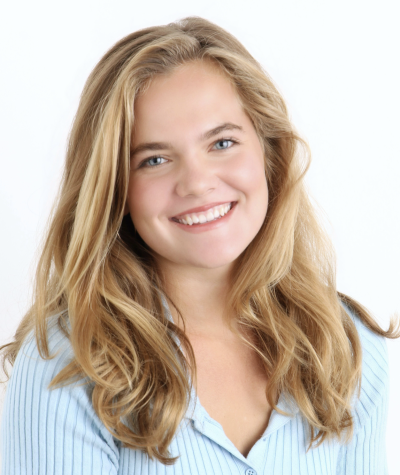
McLaine Leik (‘23) is thrilled to serve as The Forum’s Managing and Standards Editor this year! She has been writing for The Forum since her freshman...














































